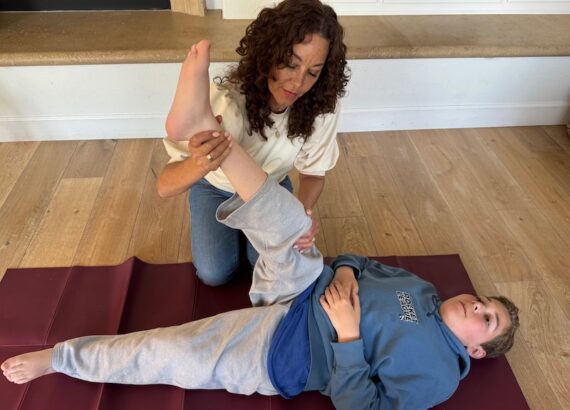Building Endurance in the New Year

Happy New Year!
Are we ready for the new year? Ready or not, it’s here.
Before we dive into it, let’s take a moment to reflect and strategize for the year ahead. Many of us are facing challenges while raising our child with a rare disease, managing packed schedules, or simply striving to make this year better than the last. Without a plan to sustain our energy and focus, the year ahead can feel overwhelming. In this post, we’ll explore a critical component for navigating the year: endurance. We’ll discuss strategies and the science behind building endurance, focusing on planning, pacing, and the importance of recovery to help us stay strong throughout the year.
The Importance of Planning and Intentionality
At the start of the new year, many people make resolutions, set intentions, or establish goals. Taking time to plan and plot the year ahead is vital. For most of us, life is filled with challenges, and it would be unwise to charge into these challenges without a plan. Spending time thinking about goals and intentions helps us chart a course. It’s not just about knowing where we’re heading but also about determining how we’ll get there. Strategies are key to carrying out our plans and goals.
One of the most challenging aspects of caregiving in the rare world is that it’s not a sprint—it’s a marathon. Without intentionality, we risk burning out within months. So, how do we build the endurance needed to sustain us through December?
Facing Unique Challenges
As mothers of children with rare diseases, we face unique circumstances. Plans can change unexpectedly due to our children’s needs. This unpredictability can leave us feeling a loss of control. However, having specific strategies helps. Like a marathon runner, we must be strategic in pacing ourselves—planning moments to jog, walk, and rest. This is how we build the endurance to navigate life in the rare world.
What Science Says About Endurance
Recovery and Rest
Research shows that recovery and rest are critical to building endurance. Athletes who prioritize rest and recovery perform better and are less prone to injury or burnout. Similarly, caregivers who incorporate rest into their routines are more likely to sustain their roles without succumbing to chronic fatigue.
A study from the University of Illinois found that periodic breaks during tasks improve focus and performance. The brain uses downtime to process information and enhance problem-solving abilities. For caregivers, this might mean taking a 15-minute walk after a stressful appointment or starting the day with prayer or meditation to approach challenges with a clearer mind.
Sleep and Endurance
Adequate sleep is foundational for endurance. Studies from the National Institutes of Health highlight that sleep deprivation impairs decision-making, emotional regulation, and physical performance. Adults who consistently get 7-9 hours of sleep perform better in cognitive tasks, demonstrate greater stress tolerance, and maintain better health over time. In a life filled with critical decisions and constant demands, getting enough sleep is non-negotiable.
Mind-Body Connection
Chronic stress depletes energy reserves and reduces endurance over time. The stress hormone cortisol, when elevated for extended periods, negatively impacts sleep, immune function, and focus. A study in The Journal of Behavioral Medicine found that activities like mindfulness or deep breathing can lower cortisol levels and improve endurance. Mindfulness training enhances resilience to stress, helping sustain focus and energy throughout challenging tasks.
Science shows that endurance isn’t about pushing harder—it’s about balancing effort and recovery. There are moments to charge forward and moments to step back and recharge. Endurance thrives in this rhythm of effort and restoration.
Common Obstacles to Endurance
- Burnout: Constantly being “on” without breaks leads to physical and emotional exhaustion.
- Guilt: Caregivers often feel guilty about taking downtime, believing they should always be doing more.
- Unpredictability: Rare disease life frequently comes with unexpected events that disrupt routines.
- Overcommitment: An overscheduled calendar accelerates energy depletion.
- Neglecting Self-Care: Ignoring physical, mental, and emotional needs weakens endurance over time.
Strategies for Building Year-Long Endurance
1. Set Manageable Goals
- Focus on 2-3 areas for the year and break them into actionable steps.
- Example: If self-care is a goal, start with 10 minutes a day doing something for yourself—reading, walking, or meditating.
2. Consider Seasonal Goal-Setting
- Break the year into quarters. Focus on 1-2 priorities each season to avoid overwhelm.
- Example: Winter: mental and physical health; Spring: growth and renewal; Summer: joy and connection; Fall: reflection and preparation.
3. Schedule with Intention
- Create energy cycles: plan activities that replenish you between those that drain you.
- Start with non-negotiables like medical appointments. Layer in recovery activities such as downtime, family fun, or creative outlets.
- Avoid consecutive high-stress days whenever possible. Balance effort and recovery.
4. Plan for Rejuvenation After Big Days
- Schedule “buffer days” following big appointments or events.
- Example: Prep freezer meals, block your calendar, and plan restful activities.
5. Build Recovery Weeks
- Every few months, schedule a lighter week to rest and reset. This is especially important after intense seasons, such as surgeries or illnesses.
- Example: After your child is recovered from a surgery, procedure, or illness, block out a week for you to recover and reset.
6. Anchor Yourself in Rituals
- Establish grounding rituals to recharge and reset.
- Example: Morning rituals like journaling or meditation; evening wind-down routines like gratitude practice or a cup of tea.
7. Plan for Joy
- Joy isn’t frivolous—it’s fuel. Build joyful activities into your schedule.
- Example: Weekly family game nights, spontaneous ice cream trips, or watching favorite movies together.
8. Adopt the Power of “No”
- Protect your time and energy by saying “no” to commitments that don’t align with your priorities.
- Saying no to draining activities allows you to say yes to restoration and care.
Closing Thoughts
As we step into the new year, let’s remember that endurance isn’t about powering through at all costs. It’s about finding rhythms that sustain us. By pacing ourselves, being intentional, and prioritizing recovery, we can navigate challenges and build a life of purpose, resilience, and care for our families and ourselves.
Wishing you a new year of strength, endurance, hope and joy!
Happy New Year!

For more holiday tips, check out this blog post on “Ten Holiday How-Tos for the Rare Mama”







